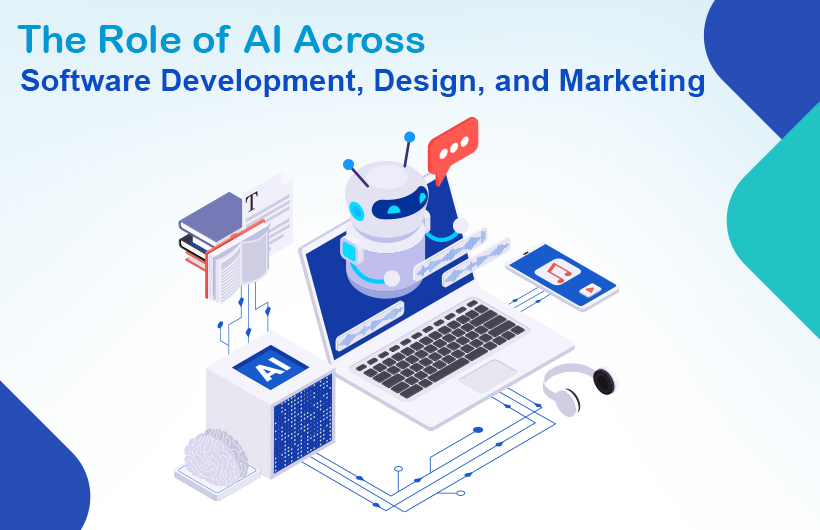AI in software development has become one of the most powerful forces transforming industries worldwide. Beyond coding and automation, it enhances design creativity and reshapes marketing strategies, driving efficiency, precision, and innovation across organisations. Today, businesses use AI not just as a tool, but as a strategic partner to improve productivity and user experiences.
Companies like Monarch Innovation are leveraging AI in software development to build smarter, faster, and more intuitive digital solutions. Let’s explore how AI is reshaping the future of software development, design, and marketing, and why it’s becoming essential for every modern business.
What is the Role of AI in Software Development?
The integration of AI in software development has fundamentally changed how developers build, test, and deploy software. Traditional software development involved repetitive coding, debugging, and quality checks that often consumed extensive time and resources. But now, AI-powered automation simplifies many of these processes.
AI can automatically generate code snippets, identify bugs, predict potential system failures, and even optimise system performance. Developers can use AI tools to assist in code reviews, accelerate testing, and deliver more reliable products faster. For example, predictive algorithms can detect potential vulnerabilities before they impact end users, a game-changer for maintaining software quality and security.
AI also assists in decision-making. Analysing vast amounts of data from user behaviour and system performance helps developers choose the most efficient frameworks, architectures, or APIs. In short, software development with AI is about creating intelligent systems that can learn, adapt, and self-correct, making development faster, smarter, and more cost-effective.
At Monarch Innovation, the focus is on harnessing the full potential of AI in software development to streamline workflows, enhance automation, and improve project delivery timelines.
How Does AI Improve Design and User Experience?
When it comes to design, AI is revolutionising the creative process. Designers no longer rely solely on intuition or manual prototyping. With AI-driven tools, they can analyse user behaviour, generate personalised layouts, and optimise interface elements in real-time.
AI-based design assistants can automatically create mockups, suggest colour palettes, and improve visual consistency based on design principles and past user interactions. This enables faster design iterations and ensures that each product is more user-friendly and data-driven.
For example, AI algorithms can analyse how users interact with an app or website — identifying which sections attract attention and which ones cause drop-offs. Designers can use this data to make informed improvements, enhancing usability and conversion rates.
Additionally, generative AI tools are making it easier to experiment with new ideas. They can instantly produce multiple design variations, giving designers a broader creative playground without wasting time on repetitive manual work.
By combining human creativity with AI-powered automation, businesses can deliver visually appealing, functional, and customer-centred designs as a key factor for product success.
How is AI Transforming Marketing Strategies?
AI is redefining marketing by shifting it from mass communication to hyper-personalised engagement. Traditional marketing relied heavily on intuition and generalised audience data. Now, with AI-powered automation, marketers can analyse real-time data to understand consumer behaviour, preferences, and purchase patterns.
For example, AI can automatically segment audiences, recommend personalised content, and even predict future buying behaviour. This ensures that marketing campaigns are more relevant and targeted at improving customer satisfaction and ROI.
Chatbots, predictive analytics, and voice-based search optimisation are some of the most common examples of AI applications in marketing. AI helps brands stay connected with their audiences 24/7 through intelligent chat assistants that can answer queries, guide purchases, or provide support.
Moreover, AI tools analyse millions of data points from social media and customer feedback to identify trends and opportunities. Marketers can then use this insight to refine campaigns and develop smarter strategies that align with real user needs.
Businesses that integrate AI into their marketing strategies can optimise ad spending, enhance personalisation, and improve lead conversion rates. In essence, AI empowers marketers to focus on creativity while automation takes care of repetitive analysis and execution.
Why is AI Adoption Crucial for the Future of Businesses?
In today’s rapidly evolving digital ecosystem, adopting AI in software development and other core business functions isn’t just an advantage; it’s a necessity. Companies that invest in AI gain better insights, reduce manual workloads, and achieve faster innovation cycles.
In software development, AI enables continuous improvement through automation and data analysis. Meanwhile, design teams use it to boost creativity while maintaining consistency and efficiency. At the same time, marketing benefits from AI-driven personalisation, creating stronger customer loyalty and engagement.
For organisations in competitive industries, especially software development in India, integrating AI technologies has become a key differentiator. Indian IT companies are now combining AI with agile methodologies and DevOps practices to deliver more intelligent and scalable solutions to global clients.
As AI continues to evolve, it will unlock even greater possibilities from predictive analytics and natural language processing to AI-driven innovation in cloud computing and cybersecurity. Businesses that adapt early will be better positioned to lead this transformation and achieve sustainable growth.
How Monarch Innovation is Using AI to Drive Digital Excellence
Monarch Innovation has been at the forefront of integrating AI into software development, design, and marketing. The company’s approach focuses on leveraging AI technologies to enhance efficiency, accuracy, and innovation across every project.
From intelligent code generation and AI-based testing to automated marketing insights and design optimisation, Monarch uses data-driven strategies to deliver high-quality solutions. Their expertise in software development with AI enables businesses to streamline operations, minimise human error, and achieve time-to-market faster.
With a strong commitment to innovation, Monarch continues to explore how AI-powered automation can unlock new opportunities in product development, digital transformation, and customer engagement. By merging human intelligence with machine learning, the company ensures that its clients stay ahead in an increasingly AI-driven world.
Final Thoughts
The integration of AI in software development has expanded far beyond just coding; it’s shaping every part of a business, from design to marketing. AI not only enhances technical capabilities but also redefines how companies connect with customers, make decisions, and drive innovation.
As industries continue to adopt intelligent technologies, the future belongs to businesses that can harness AI’s full potential. With pioneers like Monarch Innovation leading the charge, the journey toward smarter, faster, and more creative digital solutions has already begun.
FAQs
1. What is AI in software development?
AI in software development refers to the use of artificial intelligence technologies to automate coding, testing, and deployment processes, improving efficiency, accuracy, and speed in creating software applications.
2. How does AI improve software development processes?
AI streamlines repetitive tasks like code generation, bug detection, and testing, allowing developers to focus on complex problems. It reduces errors, accelerates delivery, and improves software quality.
3. Can AI enhance design creativity?
Yes. AI assists designers by generating design ideas, automating repetitive design tasks, and ensuring consistency. It can suggest layouts, colour palettes, and user experiences based on user behaviour and data analysis.
4. How is AI used in marketing strategies?
AI in marketing helps personalise customer experiences, optimise campaigns, predict customer behaviour, and improve engagement. Tools like chatbots, recommendation engines, and data analytics are commonly used.
5. Why is AI important for businesses in India and worldwide?
AI helps businesses in India and globally reduce operational costs, enhance efficiency, improve customer experiences, and gain a competitive edge in a digital-first market.






